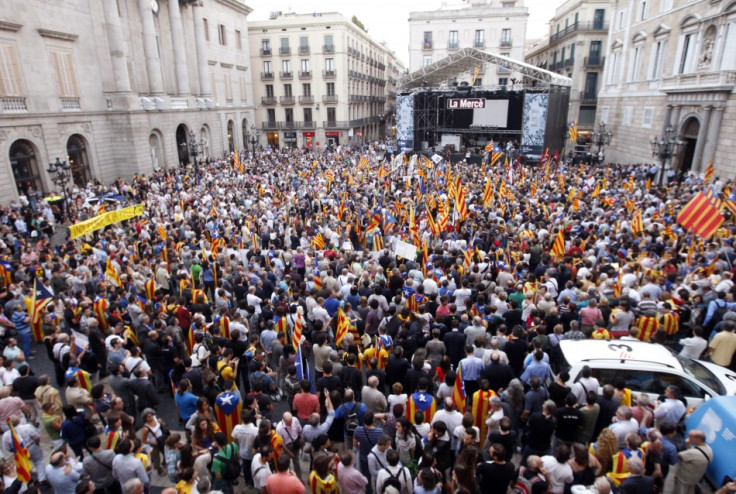Spain Faces New Investor Concern as Catalonia Election Fuels Voices for Independence

Voters in Spain's biggest and wealthiest region will go to the polls in November in a vote that threatens both the reform agenda of Prime Minister Mariano Rajoy and a serious constitutional crisis in Europe's fourth largest economy.
Spanish stocks fell heavily and bond yields rose to their highest level in three weeks after Catalonia President Artur Mas announced late Tuesday that he will hold an election on 25 November, after being rebuffed by Rajoy over demands for more control on spending and taxation in Barcelona during his negotiations for financial assistance from Madrid. Mas has vowed to offer the Catalan people a voice on independence "with or without" the authorisation of the Spanish government.
The vote could ignite separatist movements in Catalonia, Spain's most populous region, and the Basque country, which goes to the polls on 21 October, just as Rajoy is seeking to impose the bulk of his austerity measures on Spain's regions and resist calls at home and abroad to seek a full-scale bailout from his European Union partners.
Spain's benchmark IBEX index of stock prices slumped more than 3 percent Wednesday, the biggest decline of the major European markets, while 10-year bond yields rose around 5 basis points to 6.05 percent, the highest since early September and the biggest one-day rise in at least a month.
Catalonia, which accounts for around a fifth of Spanish GDP, is also the most indebted of Spain's seventeen semi-autonomous regions. Because the bulk of its spending - more than 80 percent - is focused on education and healthcare, Mas has argued that austerity measures dictated by Madrid are untenable.
Others suggest Rajoy's insistence that the regions shoulder nearly 70 percent of his proposed €50bn in spending cuts and austerity saving, despite the fact that they only comprise around 37 percent of Spain's deficit, has created a political context around Spain's reforms that endangers both its economic prospects and the future of its national unity.
"It is hard to avoid the conclusion that the centre-right government of Rajoy aims to use the present financial crisis to not only shrink the state but to recentralise it ... threatening to take over (regional) governments unless they adhere to unfeasibly tight budget controls," wrote Societe Generale economist James Nixon.
"This is the political hornet's nest into which the Troika will be stepping."
Catalonia has been locked out of financial markets for several months after having been downgraded to "junk" status by both Moody's Investors Service and Standard & Poor's. It has applied for around €5bn of financial aid from the federal government's €18bn regional rescue fund but would like to hold back a larger portion of the taxes it collects in order to stabilize its own finances. Rajoy says this violates the country's 34-year old constitution. Others note that the Basque region, which contributes far less to Spain's GDP than Catalonia, has more flexible powers on taxation.
"If Catalonia had a Basque tax regime, it would have Basque's finances, it says," Nixon wrote in a client note. "Instead of having to go cap-in-hand to Madrid for help with its debts and payroll - to be rescued, in effect, with what it regards as its own money".
The Basque country is rated Baa2 by Moody's - one notch higher than the Baa3 rating it currently has for Spain and two notches higher the Ba1 rating it has for Catalonia.
"The Basque entities' unique and constitutionally protected tax regime currently allows them to retain enough credit strength to maintain their ratings one-notch above that of the sovereign. In addition, their limited borrowing needs in 2012 and 2013 as well as their comfortable liquidity positions limit the impact of difficult market conditions on their financial performances," the agency wrote in June.
Rajoy will now find himself in the awkward position of having to argue that regional financial aid will only be meted out under strict fiscal supervision from Madrid, but a full scale bailout from the Troika must not be limited by any fiscal conditions from Brussels.
As his Popular Party government prepares to deliver its 2013 budget statement, while awaiting the results of a comprehensive banking sector audit and Moody's review of its investment grade debt rating, Rajoy is trying to buy time before his hand is forced into accepting the Troika's financial demands.
Demonstrations in Spain's capital Tuesday underscored the political risk Rajoy faces if he's unable to walk this rather fine line: police fired rubber bullets and pummelled members of the "Rodea el Congreso" anti-austerity rally with truncheons after thousands gathered outside parliament to protest his government's upcoming budget statement. Local media reports suggest as many as 35 were arrested and another 64 injured in the largest and most significant anti-government rallies since a failed military coup in 1981. Further protests are slated for Wednesday evening to coincide with a general strike in Greece.
Earlier this month, on the traditional Catalan holiday, more than 1.5 million took to the streets of Barcelona to call for independence from Madrid.
At the same time, Spain's economic prospects are looking increasingly bleak. The central bank said Wednesday that "available data for the third quarter of the year suggests that GDP kept falling at a significant rate, in a context of high financial tensions".
Barclays expects the current recession to extend well into the next two years - with a 1.8 percent contract in 2013 - and its budget deficit to miss government and EU targets by a wide margin. Unemployment is at a record-high 24.6 percent and house prices fell a record 14.4 percent in the last quarter.
© Copyright IBTimes 2025. All rights reserved.





















